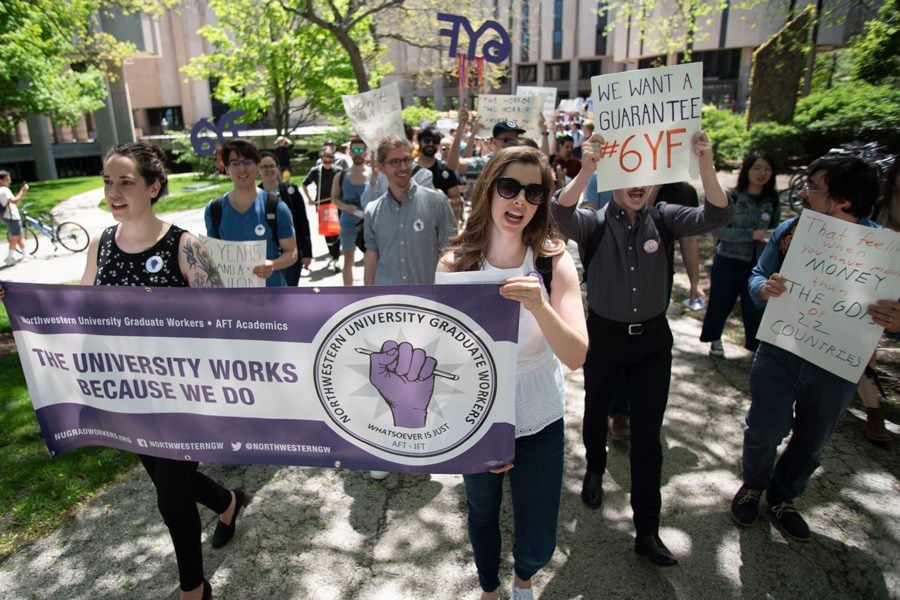Graduate students demand funding, emphasize international students’ and parents’ needs
Colin Boyle/Daily Senior Staffer
Graduate students march from Main Library to Rebecca Crown Center. Students, led by Northwestern Graduate Workers, rallied in support of guaranteed sixth-year funding on Thursday afternoon.
May 23, 2019
Northwestern graduate students rallied for guaranteed sixth-year research funding Thursday afternoon, claiming The Graduate School has the money available but refuses to use it to fund students in need.
Northwestern Graduate Workers, the University’s graduate student union, has been pushing for guaranteed sixth-year funding since TGS stopped funding sixth-year students’ research through assistantships last May. Though assistantships are only available to second through fifth-year students, TGS granted some exceptions in the past. In an email to graduate students last year, TGS Dean Teresa Woodruff said the school would no longer make those exceptions.
The protesters emphasized the importance of guaranteed funding for international students, students with families, low-income students and those with mental health issues during their march from Main Library to Rebecca Crown Center.
To have a student visa and be enrolled at a university, said sixth-year sociology graduate student Magda Boutros, international students need proof that they have funding. If they don’t provide that, she said, they can be sent back to their country of origin, and often don’t complete their research. In addition, she added, international students face extra pressure when it comes to health insurance.
“We don’t have access to Medicare and yet we have to have health insurance while we’re here,” she said. “So we have to have Northwestern health insurance, and it costs a lot of money. If you’re not funded by the University, you have to pay that out of your own pocket.”
Boutros’ research is funded through a fellowship, she said, but that fellowship is no longer available.
Students with families or mental illnesses are also put at a disadvantage, and a lack of guaranteed funding keeps academia closed off to marginalized groups, said fourth-year theater graduate student Laura Ferdinand.
“For us, sixth-year funding is a personal matter that makes the difference (between) becoming a doctor and being left on the sidelines,” Ferdinand told the crowd. “It’s time for us to demand action on behalf of all graduate students.”
During a Graduate Leadership and Advocacy Council meeting earlier this month, Woodruff told students the school is aware that many programs take six or more years to complete, and that TGS has a flexible budget.
In an email to graduate students after the meeting, Woodruff said that students in need of funding past their fifth year should contact their adviser or department or program director.
“The Graduate School will continue to work with schools and departments on a case-by-case basis while we advocate for the needs of all graduate students,” Woodruff wrote in the email. “Graduate assistantships remain under active management as a mechanism for sixth-year funding and awards have been made in some instances.”
However, fifth-year philosophy graduate student Andrew Hull said the lack of a guarantee is why students are angry — the “case-by-case” nature of the funding allocation is the problem.
“They don’t provide a guarantee of it because they want to be able to take it away, or to dip into that sixth-year funding,” he said. “They claim it provides them flexibility, but flexibility for whom? And flexibility for what?”
The University’s priority, Hull added, should be to support students and their research, not protect the endowment.
The march’s main purpose was to pressure the University to fund sixth-year graduate students’ research, said fifth-year math graduate student Kitty Yang, but the demonstration was also held in support of service workers in contract negotiations, as well as non-tenure eligible faculty.
Ferdinand emphasized that millenials “support one another,” and have been discredited and unfairly described as overly sensitive.
“What I see when I look around is a generation of serious adults who are sensitive to the needs of others… who are always looking to lend a hand,” she said to cheers at Rebecca Crown.
Administrators did not meet with the activists when they arrived at Rebecca Crown. Woodruff, when asked for comment, referred The Daily to her statements in the email she had sent graduate students earlier this month.
Email: [email protected]
Twitter: @cameron_e_cook


